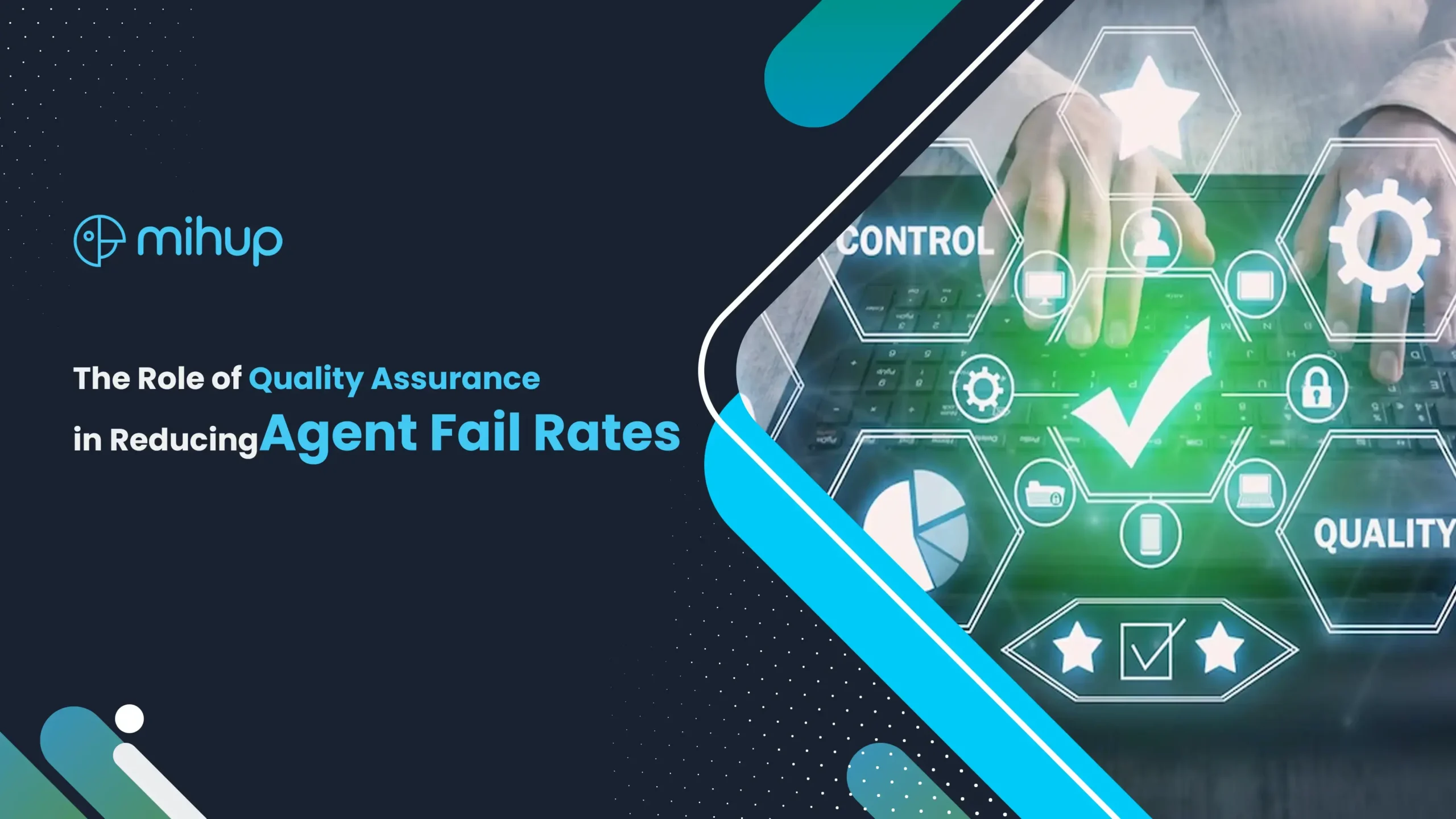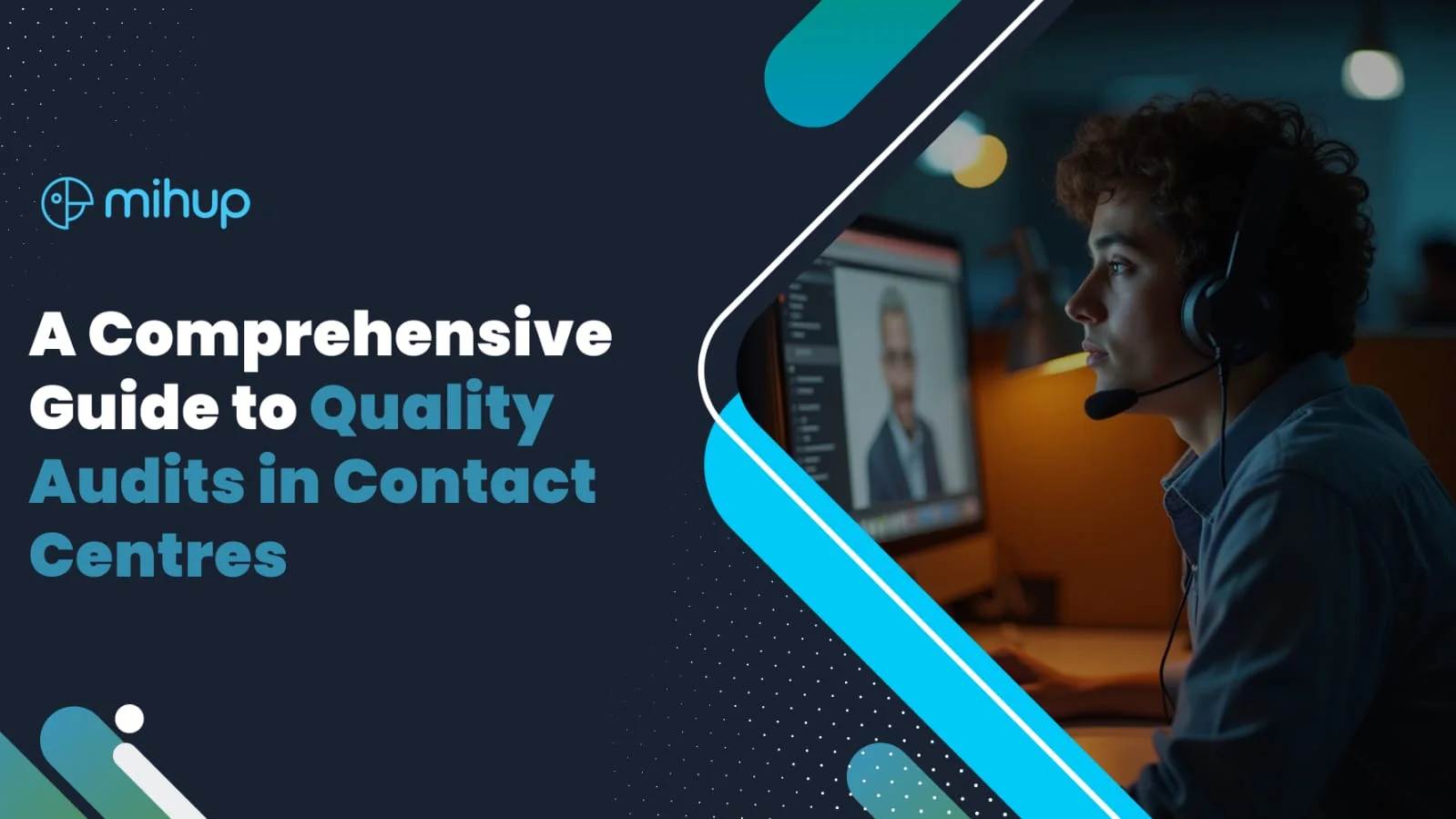Quality Assurance (QA) plays a pivotal role in the success of contact centers, ensuring that customer interactions are seamless, efficient, and aligned with organizational goals. In this blog, we will delve into the world of Quality Assurance (QA) in contact centers, exploring how it is conducted and the crucial role it plays in reducing agent fail rates. Additionally, we’ll explore the integration of AI and Speech Analytics in QA processes and highlight the significance of conducting more QA to enhance Quality Assurance. To exemplify these concepts, we will introduce Mihup Interaction Analytics as a powerful tool for conducting audits in contact centers.
What is Quality Assurance (QA) in Contact Centers?
Quality Assurance in contact centers refers to the systematic process of monitoring, assessing, and improving the interactions between customer service representatives and clients. The primary objective is to ensure that the agents adhere to predefined quality standards, delivering consistent and high-quality customer experiences. QA encompasses various elements, including communication skills, adherence to scripts and guidelines, resolution efficiency, and overall customer satisfaction.
How is QA Conducted in Contact Centers?
The process of Quality Assurance (QA) in contact centers is a systematic approach aimed at maintaining and improving the quality of customer-agent interactions. This involves a careful examination of various communication channels such as calls, emails, and chat transcripts. QA analysts, individuals often seasoned in customer service standards, play a crucial role in this process.
Manual Listening to Recorded Calls
One of the traditional methods employed in Quality Assurance (QA) is the manual review of recorded calls. QA analysts listen attentively to customer-agent conversations, paying close attention to the nuances of communication. By immersing themselves in these interactions, analysts can gauge the overall quality, identifying strengths and areas for improvement.
Assessment of Email Communications
Email communication is another significant channel for customer interactions. QA analysts review email exchanges between agents and customers, evaluating factors such as response time, language clarity, and adherence to established guidelines. This meticulous examination ensures consistency and professionalism in written communication.
Reviewing Chat Transcripts
With the rise of online communication, chat transcripts have become integral to the Quality Assurance (QA) process. Analysts carefully go through these transcripts, assessing the speed and accuracy of responses, as well as the ability to address customer concerns promptly. The review of chat interactions is crucial for maintaining high-quality customer support across diverse communication channels.
Evaluation Criteria
QA analysts employ predetermined criteria to evaluate interactions consistently. These criteria encompass various dimensions of customer service, ensuring a comprehensive assessment. Some key aspects evaluated during QA include:
a. Communication Skills:
Analysts assess the clarity, tone, and overall effectiveness of communication. This involves evaluating whether agents convey information in a manner that is easy for customers to understand and aligns with the brand’s communication standards.
b. Adherence to Guidelines:
Ensuring that agents follow scripts and guidelines is crucial for maintaining consistency in messaging. Analysts check if agents provide accurate and standardized information, adhering to the established protocols and ensuring a cohesive customer experience.
c. Problem Resolution:
The efficiency and effectiveness of issue resolution are critical factors in QA. Analysts evaluate how well agents handle and resolve customer problems, considering factors such as resolution time, accuracy, and customer satisfaction.
d. Product Knowledge:
Agents must possess comprehensive knowledge of the products or services they support. QA analysts verify that agents demonstrate a deep understanding of offerings, enabling them to provide accurate and helpful information to customers.
e. Empathy and Customer Handling:
Beyond technical proficiency, customer service involves empathy and professionalism. QA analysts assess the ability of agents to empathize with customer concerns, handle challenging situations with tact, and ensure a positive customer experience.
By evaluating interactions based on these criteria, QA analysts contribute to the continuous improvement of customer service. The insights gained from the Quality Assurance (QA) process inform training programs, highlight areas for enhancement, and ultimately lead to a higher standard of service delivery. In the ever-evolving landscape of customer expectations, the meticulous nature of QA ensures that contact centers remain responsive, efficient, and aligned with the highest standards of customer satisfaction.
Role of Speech Analytics in QA in Contact Centers
The evolution of technology, particularly the integration of Artificial Intelligence (AI) and Speech Analytics, has ushered in a transformative era for Quality Assurance (QA) in contact centers. These advancements have not only automated and streamlined the QA process but have also introduced unprecedented levels of scalability and objectivity.
Automated Call Monitoring in Quality Assurance
Gone are the days of manual analysis. The most significant contribution of Speech Analytics is automated call monitoring. AI can efficiently and swiftly analyze large volumes of customer-agent calls based on predefined criteria. This automated process significantly reduces the time and resources traditionally required for manual call monitoring. By automatically categorizing calls, it allows QA teams to focus their efforts on specific areas of interest or concern, improving the overall efficiency of the QA process.
Speech Recognition
AI-powered Speech Analytics tools bring an advanced level of sophistication to the QA process by incorporating speech recognition capabilities. These tools can transcribe spoken words accurately and efficiently. This transcends the limitations of manual transcription, enabling a more detailed analysis of customer-agent conversations. By identifying patterns and sentiments in spoken communication, Speech Analytics provides valuable insights into the emotional tone, customer satisfaction levels, and overall communication effectiveness.
Feedback and Insights
The integration of AI in Speech Analytics facilitates actionable insights and feedback during customer interactions. This is a game-changer for contact centers, as it allows immediate corrective actions to be taken. Instead of waiting for post-interaction evaluations, supervisors can intervene promptly if an agent deviates from guidelines or encounters difficulties in a conversation. This capability not only enhances the quality of individual interactions but also reduces the likelihood of repeated errors, contributing to a more dynamic and responsive customer service environment.
Performance Trends Analysis
The power of AI extends to processing vast amounts of data for performance trends analysis. Speech Analytics tools can analyze customer-agent interactions on a large scale, identifying trends and patterns that may not be apparent through manual methods. This data-driven approach provides contact centers with valuable insights into the overall performance of their agents, enabling proactive measures for continuous improvement. By understanding trends in customer queries, concerns, and satisfaction levels, organizations can strategically adjust training programs, refine communication strategies, and optimize their overall customer service approach.
The role of Speech Analytics in Quality Assurance (QA) within contact centers is pivotal in enhancing efficiency, accuracy, and responsiveness. By automating call monitoring, leveraging speech recognition, providing real-time feedback, and conducting performance trends analysis, Speech Analytics contributes significantly to the continuous improvement of customer service quality. As contact centers navigate the complexities of modern customer expectations, the adoption of AI-powered Speech Analytics emerges as a strategic imperative, enabling them to stay ahead of the curve and deliver exceptional customer experiences.
Why is it Important to Conduct More QA and Reduce Agent Fail Rates?
Customer expectations are higher than ever, and a single negative interaction can significantly impact a brand’s reputation. Conducting more QA and reducing agent fail rates is imperative for several reasons:
Enhanced Customer Satisfaction
The ultimate goal of any customer service operation is to ensure customer satisfaction. High-quality interactions, characterized by effective communication, prompt issue resolution, and a positive overall experience, contribute directly to customer satisfaction. Conducting more Quality Assurance (QA) enables organizations to identify areas for improvement and ensures that agents consistently deliver service that meets or exceeds customer expectations. Satisfied customers are more likely to remain loyal, provide positive word-of-mouth recommendations, and contribute to the long-term success of the business.
Read our blog on Customer Satisfaction with Speech Analytics.
Brand Reputation
A brand’s reputation can be built or tarnished with every customer interaction. Consistent, positive experiences create a strong and favorable brand reputation. On the contrary, frequent failures and subpar interactions can quickly erode trust and damage the perception of the brand. Conducting rigorous QA helps organizations maintain high standards of service, reinforcing a positive brand image that resonates with customers and differentiates the business from competitors.
Cost Reduction
Efficient problem resolution during the first interaction is not only a key driver of customer satisfaction but also contributes to cost reduction. When QA processes identify areas where agents can improve in issue resolution, it directly impacts operational efficiency. Resolving customer problems effectively in the initial interaction reduces the need for multiple follow-ups, minimizing the workload on agents and the overall cost of customer support operations.
Employee Development
QA serves as a valuable tool for employee development. By conducting thorough evaluations of customer interactions, QA identifies both strengths and areas of improvement for individual agents. This information becomes the foundation for targeted training programs and ongoing skill development initiatives. Investing in the professional growth of agents not only enhances their performance but also contributes to a positive work culture and employee satisfaction.
Compliance and Risk Mitigation
In industries with strict regulatory guidelines, adherence to compliance standards is non-negotiable. QA plays a critical role in ensuring that agents comply with both industry regulations and organizational policies. By conducting regular QA audits, organizations can identify and address potential compliance issues proactively, mitigating the risk of legal consequences and reputational damage. This proactive approach to compliance safeguards the organization and builds trust with both customers and regulatory bodies.
Introducing Mihup Interaction Analytics
Mihup Interaction Analytics emerges as a cutting-edge tool in the realm of contact center QA. Leveraging the power of AI, Mihup provides a comprehensive solution for conducting audits and improving customer interactions.
- AI-Assisted Audits: Mihup’s advanced algorithm aids in the audit process, enabling contact centers to analyze a vast number of interactions efficiently.
- Speech Recognition and Sentiment Analysis: Mihup’s speech analytics capabilities go beyond mere transcription. It recognizes sentiments, identifies keywords, and provides a nuanced understanding of customer-agent conversations.
- Actionable Insights: Mihup offers feedback and actionable insights, allowing immediate corrective actions for ongoing customer interactions.
- Customizable Criteria: Tailor Mihup to specific quality standards and criteria, ensuring alignment with organizational goals and industry regulations.
- Scalability: Mihup’s scalability makes it suitable for contact centers of all sizes, adapting to growing needs without compromising efficiency.
Ensuring Quality Assurance through robust processes is paramount. The integration of AI and Speech Analytics, exemplified by tools like Mihup Interaction Analytics, not only streamlines QA processes but also provides deeper insights for continuous improvement. The importance of conducting more QA to reduce agent fail rates cannot be overstated, as it directly influences customer satisfaction, brand reputation, and operational efficiency. As contact centers strive to meet and exceed customer expectations, embracing innovative QA solutions becomes a strategic imperative in today’s competitive business environment.





